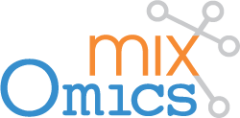[The workshop is restricted to WestMead staff only]
The objective of this workshop is to introduce the fundamental concepts of multivariate dimension reduction methodologies. Those methods are particularly useful for data exploration and integration of large data sets, and especially in the context of systems biology, or in research areas where statistical data integration is required. Each methodology that will be presented during the course will be applied on biological “omics” studies including transcriptomics, metabolomics and proteomics and microbiome data sets using the R package mixOmics (https://mixomics.org/).
Instructor: Dr Kim-Anh Lê Cao
Tutor: Ms Eva Yiwen Wang (Melbourne Integrative Genomics, University of Melbourne)
Organized and sponsored by Westmead Hub Bioinformatics (Dr Erdalh Teber)
Dates 12 April 2-5pm and 13 April 9-12pm
Practical information The workshop is free of charge for all participants. Priority will be given to students and early career researcher. The workshop includes tuition, course material. The workshop excludes tea/coffee and lunch during the breaks
Location Seminar rooms 1/2 – Children’s Medical Research Institute, 214 Hawkesbury Rd, Westmead NSW 2145
Contact mixomics[ at] math.univ-toulouse.fr
Prerequisite and requirements We require from the trainees a good working knowledge in R programming (e.g. handling data frame, perform simple calculations and display simple graphical outputs) to fully benefit from the workshop*. Participants are requested to bring their own laptop, having installed the software RStudio http://www.rstudio.com/and the R package mixOmics (instructions will be provided 2 weeks prior to the training).
*A few online resources we highly recommend to refresh / get an introduction to R:
- O’Reilly Code School TryR – this is a truly fantastic online interactive introduction to learning basic skills in R. Warning: the tutorial has a persistent pirate metaphor.
- twotorials – 2 minute videos that teach you how to do simple tasks in R. “got two minutes? Learn some statistical programming in R. Its easy, free, and FUN!”
- Data camp free Introduction to R to master the basics in R. ‘With the knowledge gained in this course, you will be ready to undertake your first very own data analysis’
Outline
Half day 1: multivariate analysis of one dataset
- Exploration of one data set with Principal Component Analysis and visualisations
- Identification of biomarkers to discriminate different treatment groups with PLS-Discriminant Analysis
Half day 2: integrative analysis of multiple datasets
- Data integration with multivariate projection-based methods and identification of multi-omics signatures
- Graphical visualisations for data integration analyses
